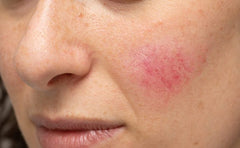So, you have sensitive skin. How do you care for it so it looks its beautiful best?
A couple of years ago it was estimated that around 50% of women were declaring they had sensitive skin, there are now reports to show that in some countries this figure has reached 91%.
But what is ‘sensitive’ skin, and do we actually know what causes sensitive skin?
The short answer: No (kind of...)
There is a multitude of reasons why people may experience itchy, red, inflamed skin such as vascular weakness, environmental factors, irritants, allergies, and eczema; these factors can work alone or in combination with one another. All of these reasons make it difficult to pinpoint the exact cause of ‘sensitive’ skin, which doesn’t make it easy on the people who experience this on a daily basis, especially when you want to take good care of your skin at the same time.
So, how do you define your skin as ‘sensitive’?
Sensitive to reactive skin is defined by noticeable unpleasant sensations such as prickling, tightness, itchiness or burning – it can also be linked with dryness, redness and flushing.

Any skin type, whether oily, dry or mature can become sensitive at any time. As skin becomes sensitised it becomes vulnerable to outside attacks and responds with these hot, red feelings which can become difficult to manage.
The skin is the most noticeable part of the body, it protects you from the outside world, shields you against the elements, the environment and daily bumps and knocks. So, when your skin isn’t playing ball, it’s easy to see how people suffer mentally as well as physically.

We can all picture the physical side effects of sensitive skin: redness, itching, tightness, heat and burning all come to mind. These are uncomfortable in themselves, but what about the mental impacts this has? In a study by the National Rosacea Society a survey of 1,675 patients with rosacea, 90% of respondents reported low self-esteem and self-confidence, 54% reported anxiety and helplessness and 43% reported depression. More than half said they actively avoided face-to-face contact.
Sensitive skin can feel like a vicious circle – stress, depression and other kinds of psychological problems can worsen skin problems. Not ideal when flare-ups of psoriasis, eczema, acne and other conditions can be unpredictable.
There are 2 main steps to managing your skin and sometimes are a little easier said than done.
The first is simple, but the second requires some self-reflection:
1. Use a gentle, yet nourishing skincare routine. Micellar cleansers, hydrating serums and lightweight moisturisers should play the main role in not only calming skin complaints but also supporting the skins natural barrier. To learn more about our new Sensitive Skincare range, click here.
2. Accepting your unique skin. Easier said than done, eh? Skincare complaints (especially rosacea, eczema and psoriasis) have all been shown to worsen when stressed. Taking time out to practice self-care and take back the control is a major key to living with your skin.

Some tips to help you make peace and learn to embrace your beautiful skin:
- Make patch testing a part of your routine. Add a small amount of product to the inside of your arm and leave overnight, if no reaction, then add a small amount to your jaw and leave again overnight. This should make you feel more comfortable in applying to the rest of your face.
- Avoid over-washing and over-exfoliating. Doing both of these things weakens the protective barrier of the skin – use something light like micellar water and an organic cotton pad to remove make-up, SPF and daily grime.
- Journaling is not only a way to reduce stress and create more control in your life but you can also start to track your skin. Notice what causes your sensitive skin – foods, times of the month, etc. The more in-tune you become with your body the easier it will be to find your triggers and minimise these, therefore minimising flare-ups.
- Keep your skincare routine simple. It’s easy to get caught up in trying 101 items that promise clear skin, but the truth is stripping things back and taking it slowly is the key. Look for organic ingredients, that have been dermatologically tested, are fragrance-free and are alcohol-free.
- Manage stress. We now understand how stress impacts our skin so taking time to reduce stress can be a very beneficial way to begin to manage our skin. Consider yoga, meditation, long gentle walks or anything that makes you feel calm!



